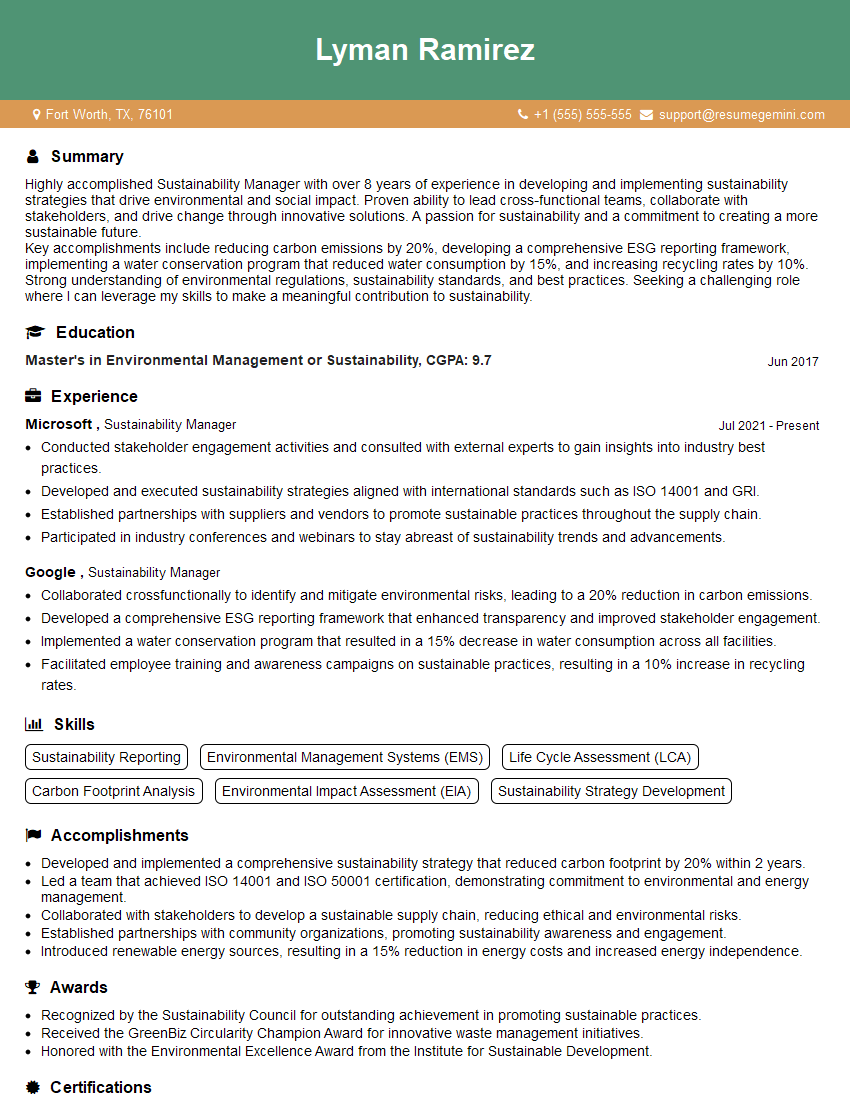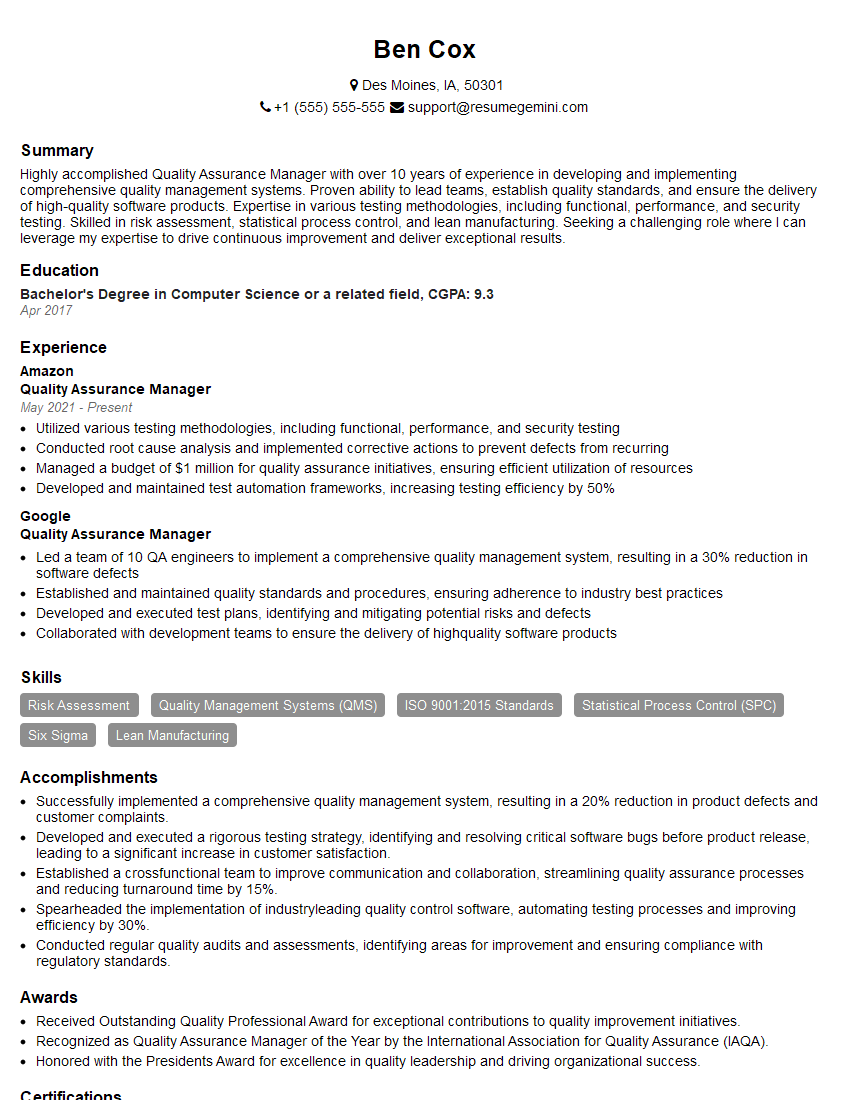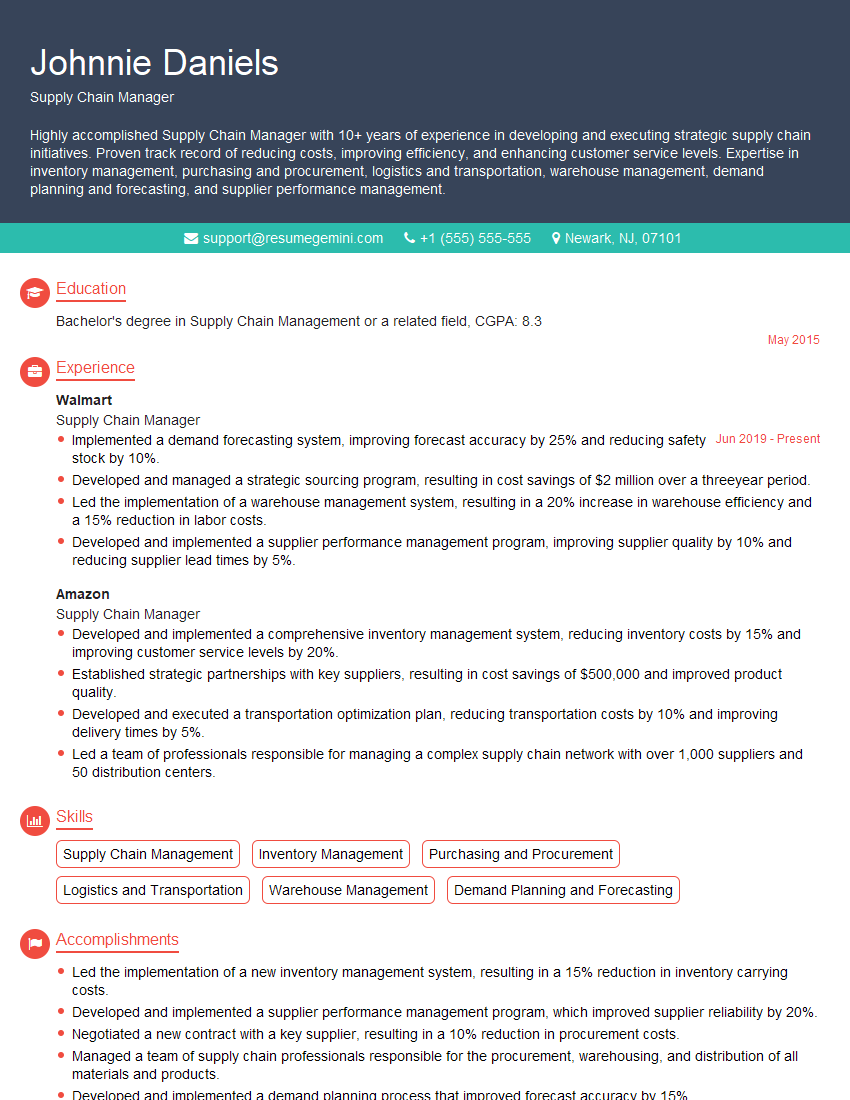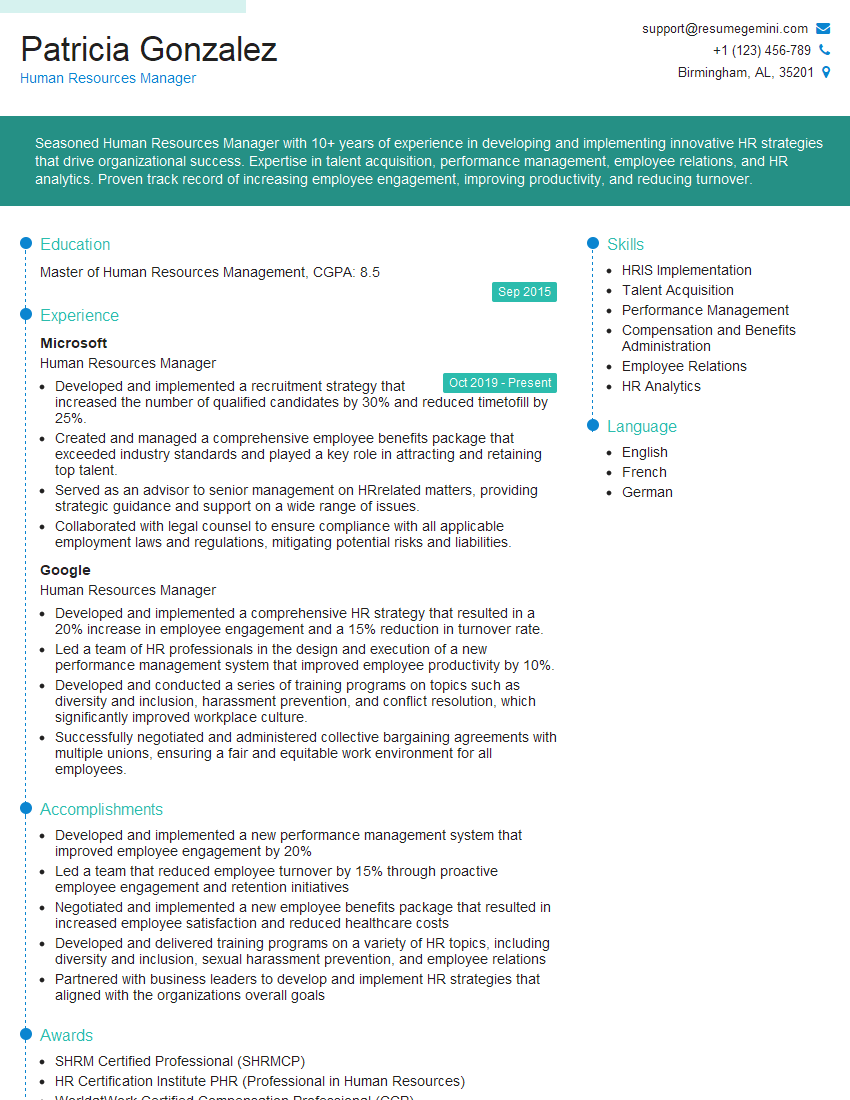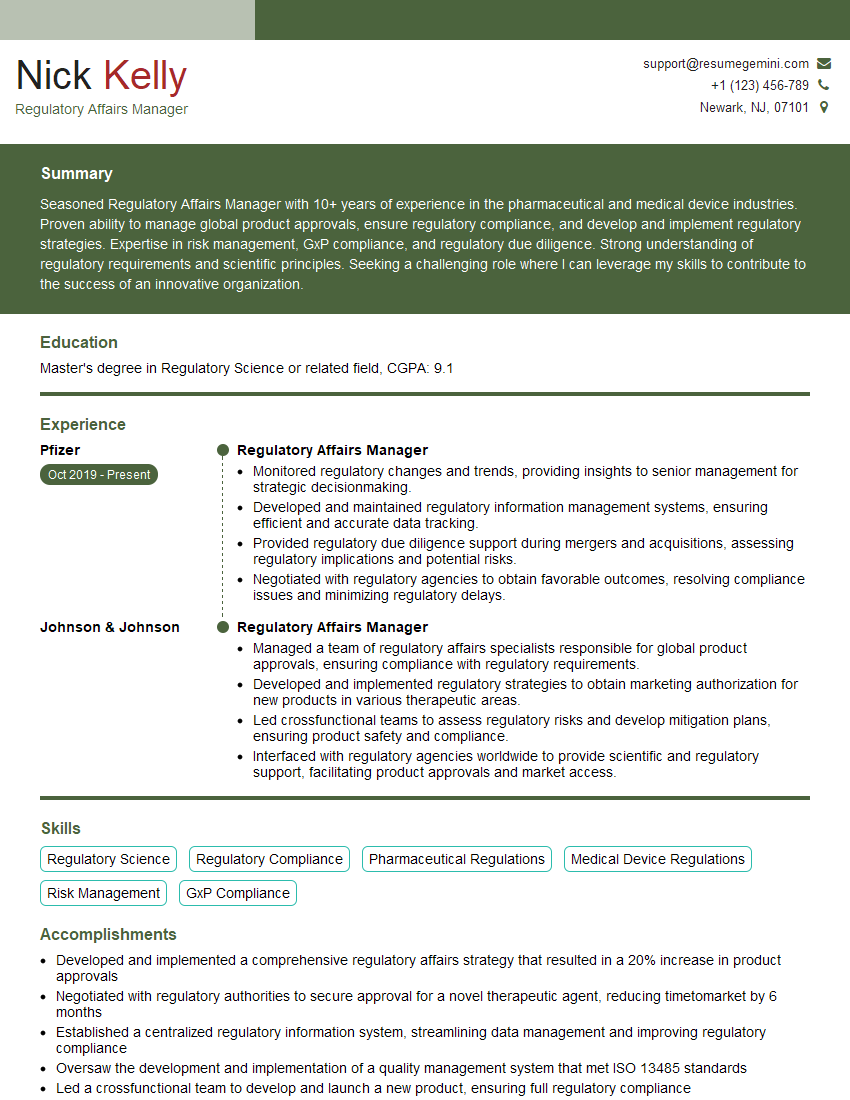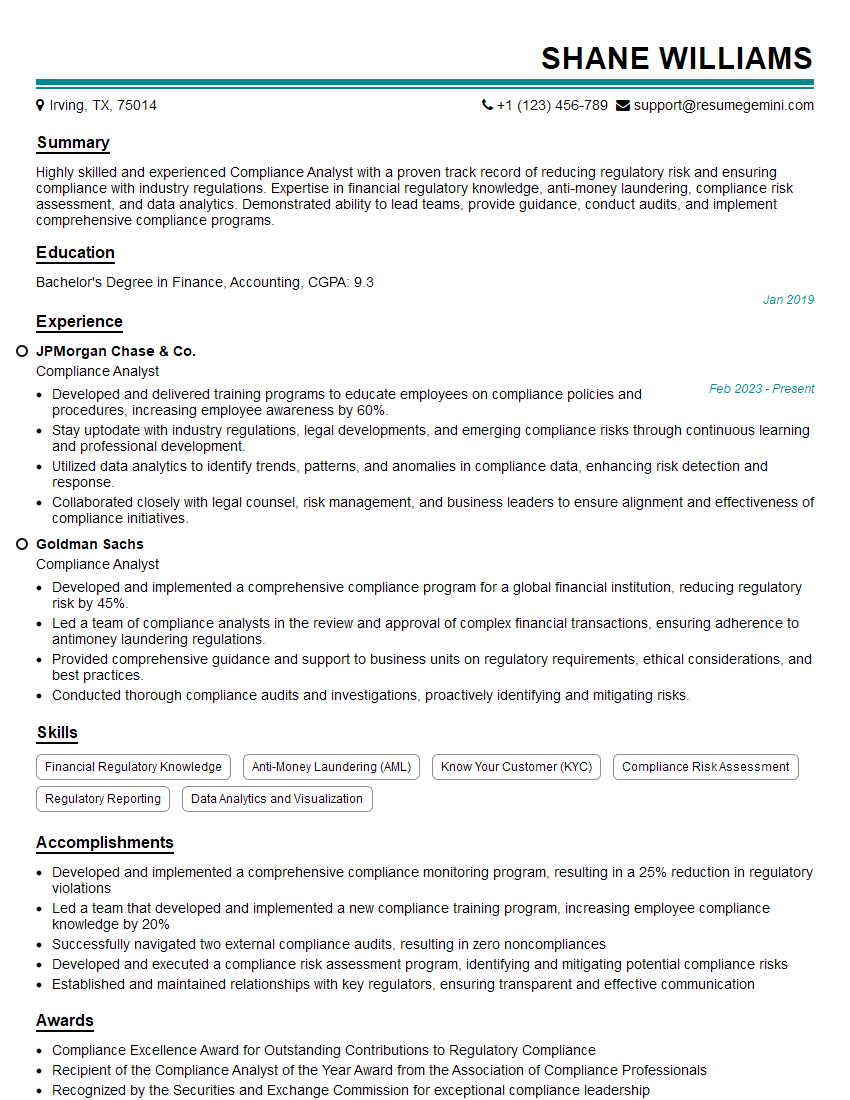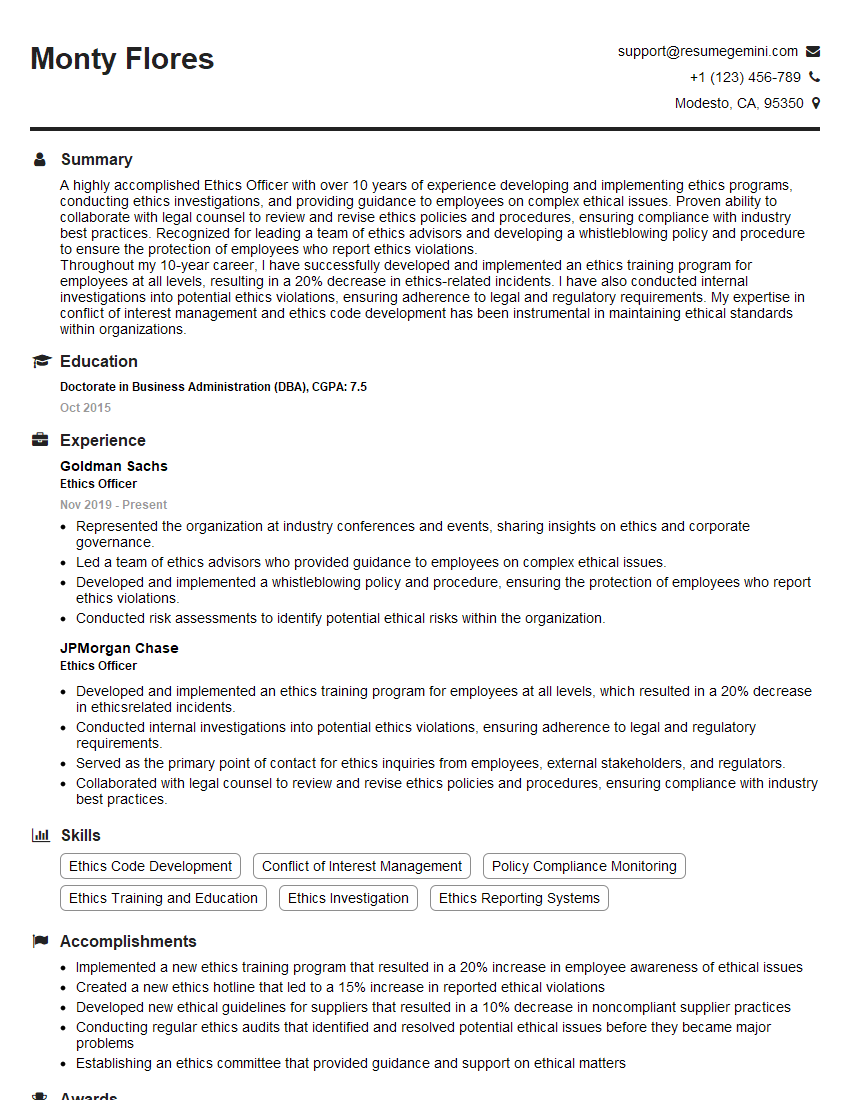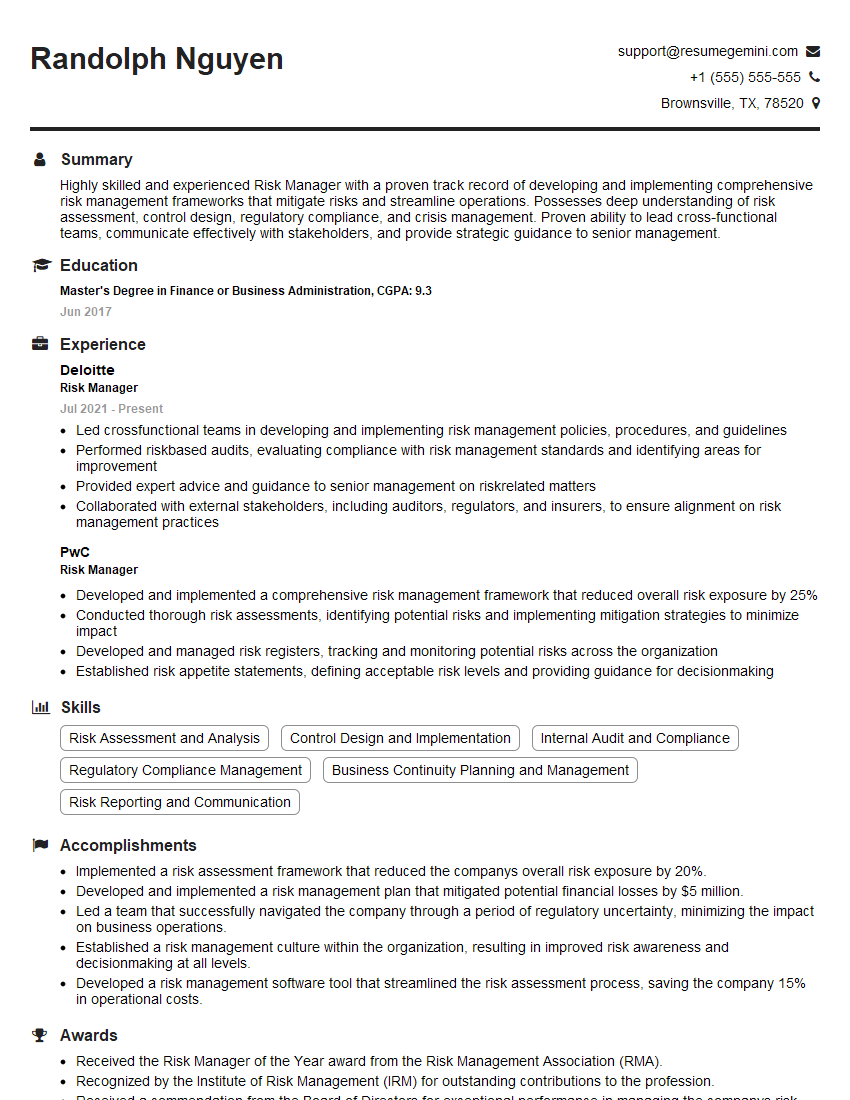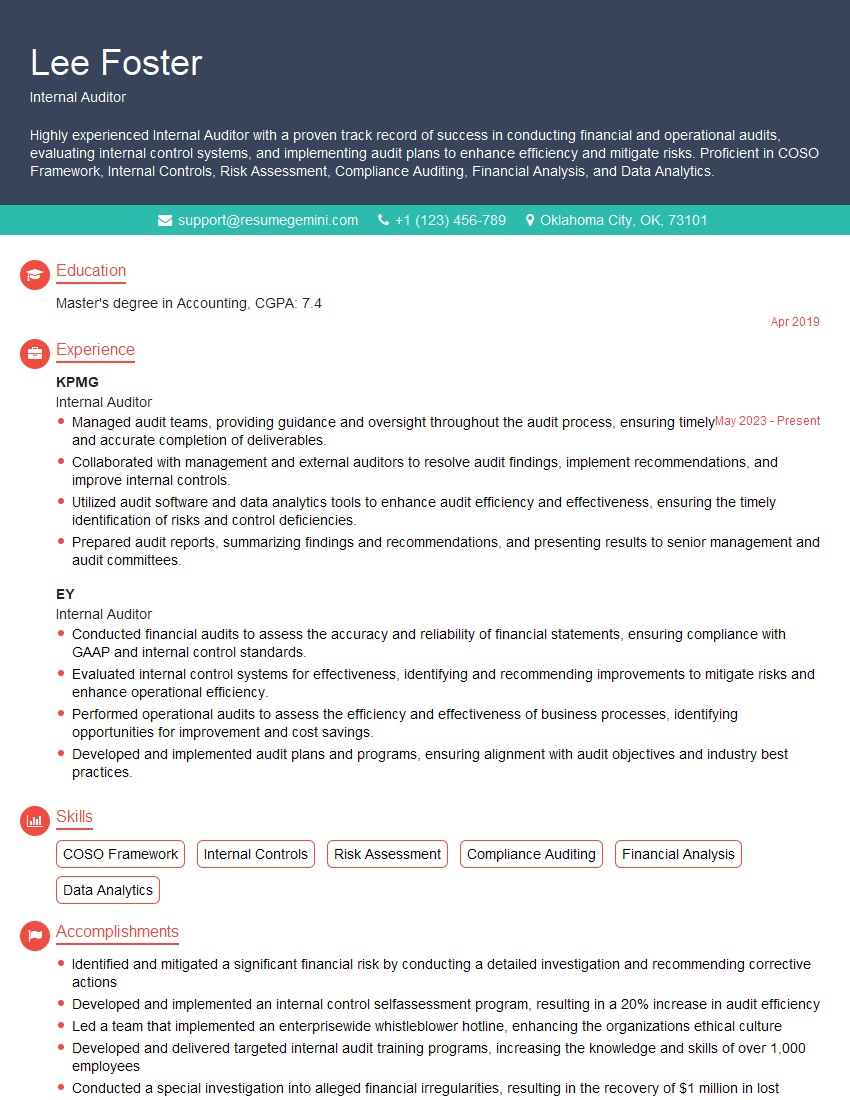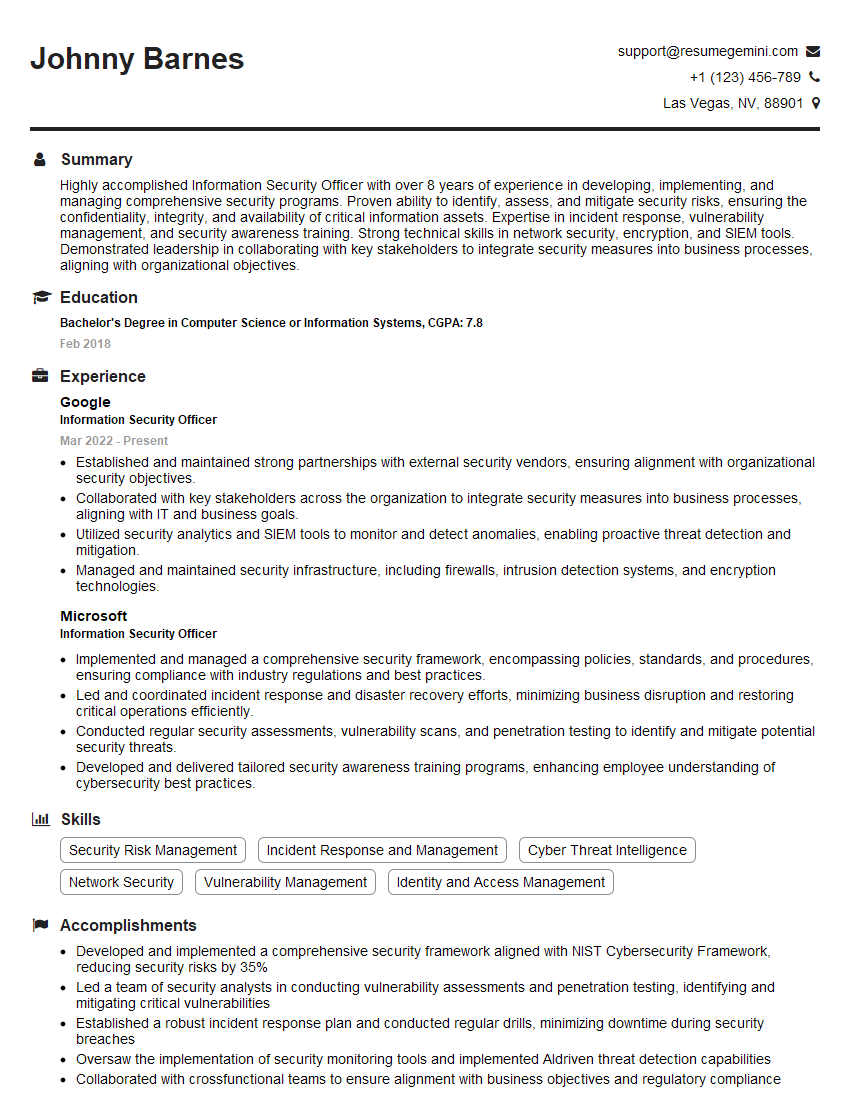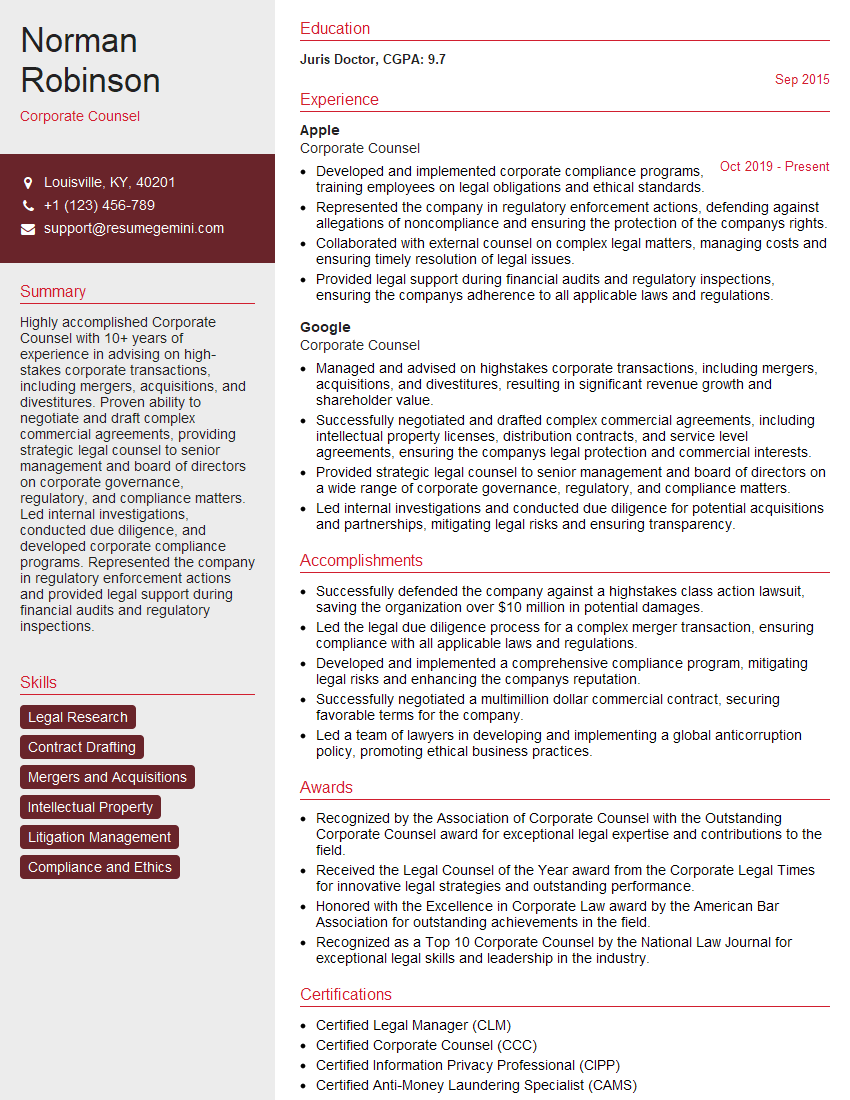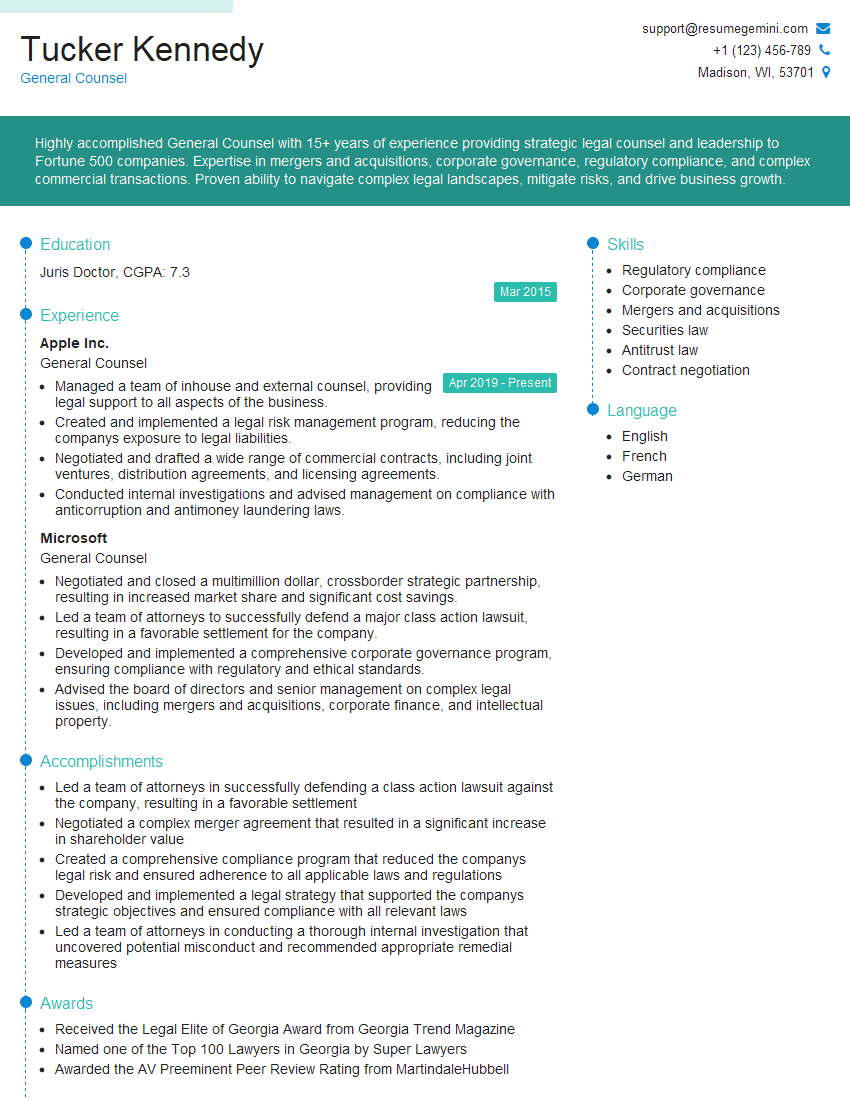Preparation is the key to success in any interview. In this post, we’ll explore crucial Maintaining a Strong Code of Ethics interview questions and equip you with strategies to craft impactful answers. Whether you’re a beginner or a pro, these tips will elevate your preparation.
Questions Asked in Maintaining a Strong Code of Ethics Interview
Q 1. Describe a situation where you had to uphold ethical principles despite pressure to do otherwise.
Maintaining ethical principles under pressure is crucial. In a previous role, I was tasked with delivering a project under a tight deadline. The pressure to meet this deadline was immense, and my team considered cutting corners, specifically compromising data security to expedite the process. This would have violated our company’s code of conduct and potentially exposed sensitive client information.
I firmly advocated against this shortcut. I explained the potential legal and reputational risks, and proposed alternative solutions to manage the deadline without sacrificing ethical standards. These alternatives involved prioritizing tasks, reallocating resources, and transparently communicating potential delays to stakeholders. Although initially met with resistance due to the time constraints, my persistent advocacy for ethical conduct ultimately prevailed. The project was completed successfully, albeit slightly delayed, without compromising security. This experience reinforced my belief in the long-term value of adhering to ethical principles, even when facing considerable pressure.
Q 2. How would you handle a conflict of interest within your team?
Conflicts of interest are a serious ethical concern. If a conflict arises within my team, my approach would involve:
- Immediate Identification and Disclosure: The individual experiencing the conflict must immediately disclose it to their supervisor and myself. Transparency is key.
- Assessment and Mitigation: We would carefully assess the nature and extent of the conflict. This might involve examining potential biases, financial gains, or personal relationships that could influence decisions.
- Recusal and Transparency: The affected team member might need to recuse themselves from decisions related to the conflict. We would ensure complete transparency with all stakeholders regarding the conflict and the steps taken to address it.
- Documentation and Review: The entire process, including the conflict, the mitigation strategies, and the final resolution, would be thoroughly documented.
- Prevention: We would review our processes to identify systemic issues that might have contributed to the conflict and implement changes to prevent similar situations in the future.
The goal is to maintain fairness, impartiality, and the integrity of the team’s work while supporting the affected individual.
Q 3. Explain your understanding of a company’s code of conduct.
A company’s code of conduct serves as a cornerstone of ethical business practices. It’s a formal document outlining the organization’s values, principles, and expectations for employee behavior. It guides decision-making, ensures accountability, and promotes a culture of integrity. A comprehensive code of conduct typically addresses areas such as:
- Ethical principles: Honesty, integrity, fairness, respect.
- Compliance with laws and regulations: Adherence to all relevant legal frameworks.
- Conflicts of interest: Procedures for identifying and managing potential conflicts.
- Data privacy and security: Safeguarding sensitive information.
- Workplace conduct: Professionalism, harassment, discrimination.
- Reporting mechanisms: Processes for reporting ethical violations.
Essentially, the code of conduct acts as a roadmap for ethical behavior, minimizing risks and fostering a positive work environment.
Q 4. What steps would you take if you witnessed unethical behavior in the workplace?
Witnessing unethical behavior requires a careful and considered response. My approach would follow these steps:
- Gather Information: I would first ensure I have a clear understanding of the situation, gathering factual evidence without resorting to gossip or assumptions.
- Consider the Severity: The seriousness of the unethical behavior will influence my next steps. Minor infractions might require a less formal approach than serious violations.
- Internal Reporting Channels: I would use the company’s established channels for reporting unethical conduct, such as a hotline, ethics officer, or supervisor. This ensures a proper investigation and follow-up.
- Documentation: I would meticulously document all relevant information, including dates, times, witnesses, and any evidence collected.
- Escalation (if necessary): If my initial report is not adequately addressed, I would consider escalating the matter to higher authorities within the organization or, if necessary, external regulatory bodies.
My priority would be to ensure the unethical behavior is addressed while protecting myself from retaliation.
Q 5. How do you prioritize ethical considerations when making business decisions?
Ethical considerations should be integral to all business decisions. I prioritize them by using a framework that integrates ethical analysis into the decision-making process:
- Identify Ethical Concerns: What are the potential ethical implications of this decision? Who might be affected, and how?
- Stakeholder Analysis: Identify all stakeholders involved and consider their perspectives and potential impact.
- Consequences Assessment: What are the potential positive and negative consequences of each option? Consider the short-term and long-term effects.
- Ethical Frameworks: Apply ethical frameworks such as utilitarianism (greatest good for the greatest number), deontology (duty-based ethics), or virtue ethics (character-based ethics) to guide the decision.
- Transparency and Accountability: Document the decision-making process, including the ethical considerations. Be prepared to justify the decision to stakeholders.
This framework helps ensure that ethical considerations are not an afterthought, but a fundamental part of strategic planning and decision-making.
Q 6. Describe your experience with compliance regulations.
My experience with compliance regulations is extensive. I’m familiar with various regulations, including those related to data privacy (GDPR, CCPA), financial reporting (SOX), and industry-specific standards. My experience involves ensuring compliance through:
- Policy Development and Implementation: Contributing to the creation and implementation of company policies that align with relevant regulations.
- Risk Assessment: Identifying potential compliance risks and developing mitigation strategies.
- Training and Education: Conducting training programs for employees to increase awareness of compliance obligations.
- Audits and Monitoring: Participating in internal and external audits to verify compliance.
- Reporting and Remediation: Reporting any compliance issues and implementing corrective actions.
I understand that maintaining compliance is not merely a legal obligation but also critical to maintaining trust with clients, partners, and stakeholders.
Q 7. How would you address a situation where a company policy conflicts with your personal ethics?
A conflict between company policy and personal ethics is a challenging situation. My approach would involve:
- Careful Consideration: I would carefully evaluate the nature of the conflict. Is it a minor discrepancy or a significant ethical violation?
- Internal Channels: I would attempt to resolve the conflict internally by discussing my concerns with my supervisor or an ethics officer. I would aim to understand the rationale behind the policy and explore potential alternatives.
- Documentation: I would meticulously document my concerns, the discussions held, and the steps taken to address the conflict.
- Professional Advice (if necessary): If the internal resolution attempts fail, I might seek advice from legal counsel or professional ethics organizations.
- Ethical Decision: Ultimately, I would make a decision based on my ethical principles and professional judgment, recognizing the potential consequences of my actions. This might involve seeking alternative employment if the conflict is irreconcilable.
While I would strive to find a solution that respects both company policy and my personal ethics, my ethical principles would ultimately guide my actions.
Q 8. What is whistleblowing, and under what circumstances is it justified?
Whistleblowing is the act of reporting unethical or illegal activities within an organization to an external authority, such as a regulatory agency or the media. It’s a crucial mechanism for ensuring accountability and transparency. It’s justified when:
- Serious harm is imminent or occurring: This includes situations like fraud, safety violations endangering lives, or significant environmental damage.
- Internal channels have failed: You’ve exhausted all internal reporting mechanisms, and your concerns haven’t been addressed adequately.
- There’s evidence to support the claim: Your report needs to be based on credible evidence, not mere suspicion.
- The potential benefit outweighs the risks: Consider the potential consequences of blowing the whistle, including potential retaliation. The severity of the unethical act should justify the personal risk.
For example, imagine discovering your company is dumping toxic waste illegally. After exhausting internal channels without resolution, whistleblowing to the Environmental Protection Agency would be justified because of the potential for severe environmental damage and harm to public health.
Q 9. How do you ensure confidentiality when handling sensitive ethical issues?
Maintaining confidentiality when handling sensitive ethical issues is paramount. This requires a multi-faceted approach:
- Strict adherence to privacy policies: Familiarize yourself with and rigorously follow your organization’s data protection policies and relevant laws like HIPAA or GDPR.
- Need-to-know basis: Share information only with individuals directly involved in addressing the ethical issue. Avoid casual conversations about sensitive matters.
- Secure communication channels: Utilize encrypted email, secure messaging platforms, or confidential reporting systems when discussing sensitive information.
- Proper documentation: Keep detailed records of all communications and actions taken, while adhering to data protection regulations.
- Anonymity (where possible): If reporting an ethical concern, explore whether anonymous reporting channels are available to protect your identity.
Think of it like a doctor-patient relationship; the information shared is treated with the utmost respect for confidentiality. Breaking that trust can have severe legal and ethical consequences.
Q 10. How would you educate others on the importance of ethical conduct?
Educating others on ethical conduct requires a multi-pronged strategy:
- Interactive workshops and training: Organize engaging sessions that go beyond simple lectures, incorporating case studies, role-playing, and discussions to promote critical thinking.
- Code of conduct reinforcement: Regularly remind employees of the organization’s code of ethics, making it easily accessible and regularly reviewed.
- Clear examples and case studies: Illustrate ethical dilemmas and their resolutions through realistic scenarios, demonstrating the consequences of both ethical and unethical behavior.
- Mentorship programs: Pair experienced employees with newer ones to guide them through ethical challenges and establish a culture of ethical decision-making.
- Open communication channels: Create an environment where employees feel comfortable asking questions and reporting concerns without fear of retaliation.
Think of it like building a strong ethical foundation. Continuous reinforcement and education are essential to ensure ethical behavior becomes ingrained in the organizational culture.
Q 11. Describe a time you had to report unethical behavior. What was the outcome?
In a previous role, I discovered a colleague was falsifying expense reports. After attempting to address the issue internally through my manager (who seemed hesitant to act), I documented the evidence and reported it to the company’s ethics hotline. An internal investigation was launched, confirming the misconduct. The colleague was subsequently disciplined, and changes were implemented to improve expense report oversight. The outcome highlighted the importance of proper internal reporting mechanisms and the need for swift and decisive action when unethical behavior is identified.
Q 12. How do you identify potential ethical risks in a project?
Identifying potential ethical risks in a project requires a proactive approach. I utilize a risk assessment framework that considers:
- Data privacy: How will sensitive data be handled and protected throughout the project lifecycle?
- Conflicts of interest: Are there any potential conflicts of interest among stakeholders or team members?
- Intellectual property: Will the project involve the use or creation of intellectual property, and are the necessary rights secured?
- Environmental impact: What are the potential environmental consequences of the project, and are there mitigation strategies in place?
- Transparency and accountability: How will transparency and accountability be ensured throughout the project?
By systematically evaluating these aspects, I can proactively identify and mitigate potential ethical risks before they materialize. This approach helps to ensure the project is not only successful but also ethically sound.
Q 13. Explain your understanding of corporate social responsibility.
Corporate social responsibility (CSR) is a self-regulating business model that helps a company be socially accountable—to itself, its stakeholders, and the public. By practicing corporate social responsibility, companies can be conscious of the kind of impact they are having on all aspects of society, including economic, social, and environmental. It encompasses a company’s commitment to operate ethically and contribute positively to society. This goes beyond simply complying with laws and regulations. It involves considering the broader impact of business decisions on:
- Environmental sustainability: Reducing carbon footprint, conserving resources, and minimizing pollution.
- Social equity: Promoting fair labor practices, diversity, and inclusion.
- Economic development: Supporting local communities and contributing to economic growth.
- Ethical sourcing: Ensuring products are sourced ethically and sustainably.
For example, a company might invest in renewable energy sources, support local charities, or implement fair trade practices. CSR is not merely a public relations exercise; it’s integral to long-term business success and building a positive reputation.
Q 14. How would you handle a situation where a client pressures you to compromise ethical standards?
If a client pressures me to compromise ethical standards, I would:
- Clearly articulate the ethical concerns: I would calmly and professionally explain why the requested action is unethical and violates my professional code of conduct.
- Document the request: I would keep a detailed record of the client’s request and my response.
- Explore alternative solutions: I would brainstorm alternative approaches that meet the client’s needs without compromising ethical standards.
- Seek internal guidance: If the situation remains unresolved, I would consult with my supervisor or a designated ethics officer within my organization.
- Consider termination of the engagement (if necessary): If the client’s demands remain unacceptable despite my efforts, I would consider ending the professional relationship to uphold my ethical principles.
Maintaining my integrity is paramount. While client satisfaction is important, it should never come at the expense of ethical conduct. This situation demonstrates the importance of having a strong ethical compass and the courage to stand by your principles.
Q 15. Describe a time you had to make a difficult ethical decision. What factors did you consider?
One of the most challenging ethical dilemmas I faced involved a project where a shortcut could significantly reduce development time, potentially impacting a product launch deadline. However, this shortcut involved using a third-party library with a questionable license, potentially violating our company’s commitment to open-source compliance and intellectual property rights.
The factors I considered were:
- Legal Compliance: Thoroughly researching the library’s license and understanding the potential legal ramifications of using it.
- Company Values: Aligning my decision with our organization’s ethical code of conduct, emphasizing transparency and integrity.
- Long-Term Risks: Assessing the potential reputational damage and financial implications of non-compliance, weighing it against the immediate benefits of the faster launch.
- Stakeholder Impact: Considering how the decision would affect clients, developers, and the company’s overall standing in the industry.
Ultimately, I decided against using the shortcut. While it delayed the product launch slightly, preserving our ethical and legal standing was deemed far more crucial for long-term success. We found an alternative solution, albeit a slightly more time-consuming one, ensuring complete compliance and upholding our commitment to ethical practices.
Career Expert Tips:
- Ace those interviews! Prepare effectively by reviewing the Top 50 Most Common Interview Questions on ResumeGemini.
- Navigate your job search with confidence! Explore a wide range of Career Tips on ResumeGemini. Learn about common challenges and recommendations to overcome them.
- Craft the perfect resume! Master the Art of Resume Writing with ResumeGemini’s guide. Showcase your unique qualifications and achievements effectively.
- Don’t miss out on holiday savings! Build your dream resume with ResumeGemini’s ATS optimized templates.
Q 16. How familiar are you with relevant ethical frameworks (e.g., utilitarianism, deontology)?
I’m very familiar with several ethical frameworks, including utilitarianism and deontology. Utilitarianism focuses on maximizing overall happiness and well-being, often by considering the consequences of actions. A utilitarian approach might justify a minor compromise on individual rights to achieve a greater good, like prioritizing a life-saving drug’s production even if it requires temporarily delaying the launch of a less critical project.
Deontology, on the other hand, emphasizes moral duties and rules, regardless of the consequences. A deontological perspective would strictly adhere to pre-defined rules and principles, even if it results in less desirable outcomes. For example, a deontologist might refuse to lie, even if it means compromising the success of a project. I believe a balanced approach, integrating elements from both frameworks, considering both the potential consequences and adherence to fundamental principles, provides a comprehensive guide to ethical decision-making. I also find virtue ethics, focusing on character and moral excellence, to be very relevant in a professional setting.
Q 17. What resources would you use to resolve ethical dilemmas?
When confronting ethical dilemmas, I utilize several resources to reach a well-informed decision. These include:
- Company’s Code of Conduct and Policies: My primary resource is our company’s internal guidelines on ethics and compliance, offering clear instructions on how to navigate potential conflicts.
- Legal Counsel: If the dilemma involves complex legal aspects, consulting with our legal team provides guidance on navigating relevant laws and regulations.
- Mentors and Supervisors: Discussing the dilemma with experienced colleagues and supervisors helps gain different perspectives and valuable insights.
- Industry Best Practices and Professional Organizations: Staying updated on industry-specific ethical standards through professional organizations and publications helps in understanding common ethical challenges and best practices.
- Ethical Frameworks and Decision-Making Models: Applying ethical frameworks like the ones mentioned earlier, along with structured decision-making models, helps in making a rational and principled decision.
By leveraging these resources, I aim to make informed and responsible decisions that align with both ethical principles and business objectives.
Q 18. How do you balance ethical considerations with business objectives?
Balancing ethical considerations with business objectives requires a nuanced approach that recognizes that both are essential for long-term success. They are not mutually exclusive; rather, a strong ethical foundation often strengthens business outcomes.
I approach this balance by:
- Identifying Ethical Risks Early: Integrating ethical considerations into the initial phases of project planning helps to prevent potential conflicts and delays down the line.
- Prioritizing Transparency and Open Communication: Maintaining open communication with stakeholders ensures that all parties understand the ethical implications of decisions and that everyone is on the same page.
- Seeking Creative Solutions: Exploring alternative strategies that address both ethical and business concerns often leads to innovative and sustainable solutions.
- Long-Term Perspective: Prioritizing long-term ethical conduct over short-term gains ensures that the business remains sustainable and trustworthy.
For example, if a faster, cheaper solution exists but compromises user data privacy, a discussion about alternative, more ethical approaches that might require more time or resources would be needed, potentially leading to better outcomes in the long run due to increased customer trust and loyalty.
Q 19. How do you stay updated on changes in ethics and compliance regulations?
Staying updated on changes in ethics and compliance regulations is crucial. I achieve this through several means:
- Subscribing to Relevant Publications and Newsletters: I regularly read industry publications and newsletters focusing on ethics, compliance, and relevant legal updates.
- Attending Industry Conferences and Webinars: Participating in conferences and webinars allows for networking and learning from experts on current ethical challenges and best practices.
- Professional Development Courses: I actively seek professional development opportunities to stay updated on the latest regulations and best practices in ethical conduct.
- Monitoring Regulatory Websites: I regularly check government websites and regulatory bodies for updates on laws and regulations relevant to my field.
Continuous learning is crucial in this field because laws and best practices evolve constantly.
Q 20. What are some common ethical challenges faced in your field?
In my field, several common ethical challenges exist:
- Data Privacy and Security: Protecting user data and maintaining its confidentiality is paramount. Breaches can have significant legal and reputational consequences.
- Intellectual Property Rights: Ensuring compliance with open-source licensing and respecting intellectual property rights of others is essential for avoiding legal issues.
- Bias in Algorithms and AI: Mitigating biases in algorithms and artificial intelligence systems is critical to ensure fairness and avoid discriminatory outcomes.
- Transparency and Accountability: Maintaining transparency in decision-making processes and taking accountability for actions is essential for building trust.
- Conflicts of Interest: Identifying and managing potential conflicts of interest are crucial for maintaining impartiality and avoiding unethical behavior.
Addressing these challenges proactively through thorough planning, robust compliance programs, and continuous ethical reflection is key for success.
Q 21. How do you ensure that ethical considerations are incorporated into project planning?
Integrating ethical considerations into project planning is not an afterthought; it’s a fundamental step. I ensure this by:
- Defining Ethical Considerations Upfront: From the project initiation stage, we identify potential ethical risks and challenges, ensuring they are explicitly addressed in the project plan.
- Developing Ethical Guidelines Specific to the Project: Creating project-specific ethical guidelines ensures alignment with overall company policies while addressing unique project-related concerns.
- Risk Assessment and Mitigation: A detailed risk assessment identifies potential ethical issues and outlines strategies for mitigating them. This might involve implementing additional testing or review processes.
- Ethical Review Boards or Committees: Establishing an ethical review board for major projects provides an independent assessment and ensures alignment with ethical principles.
- Regular Ethical Check-ins: Throughout the project lifecycle, we conduct regular ethical check-ins to monitor progress, address emerging issues, and maintain alignment with established guidelines.
By integrating ethics into every phase of project planning, we mitigate risks and ensure responsible conduct.
Q 22. Describe your experience implementing ethical guidelines within a team.
Implementing ethical guidelines within a team requires a multi-faceted approach focusing on communication, training, and consistent application. It’s not just about having a document; it’s about embedding ethical considerations into the team’s DNA.
In my previous role at a software development company, we lacked a clearly defined code of conduct. To address this, I spearheaded the creation of a comprehensive document covering issues such as data privacy, intellectual property, conflict of interest, and respectful communication. We didn’t just distribute it; we held workshops where we discussed real-world scenarios, role-played ethical dilemmas, and encouraged open dialogue. We even used a scenario-based training program which presented ethical challenges common in our field, prompting team members to explore appropriate actions. Following the training, we established a clear reporting mechanism for ethical concerns, ensuring anonymity and protecting whistleblowers.
The results were tangible. We saw a significant increase in team members’ awareness of ethical considerations, leading to fewer incidents and a more collaborative and trusting work environment. For example, a previously unclear policy regarding the use of open-source software was clarified, preventing potential copyright infringements.
Q 23. How do you foster an ethical workplace culture?
Fostering an ethical workplace culture is a continuous process, not a one-time event. It requires leadership commitment, consistent communication, and a proactive approach to identifying and addressing ethical challenges. Think of it as building a strong foundation, brick by brick.
- Lead by Example: Leaders must embody the ethical values they expect from their teams. This includes transparency in decision-making, fairness in resource allocation, and accountability for actions.
- Establish Clear Guidelines: A well-defined code of ethics, accessible to all employees, is crucial. This should be more than just a document; it should be integrated into daily operations.
- Provide Regular Training: Ongoing ethical training, tailored to the specific challenges of the workplace, keeps employees informed and updated on best practices and relevant regulations.
- Create a Culture of Open Communication: Encourage employees to report ethical concerns without fear of retribution. Establish anonymous reporting mechanisms and ensure thorough investigation of all allegations.
- Celebrate Ethical Conduct: Recognize and reward employees who demonstrate exemplary ethical behavior. This reinforces the importance of ethical conduct and encourages others to follow suit.
For instance, in a previous project, we regularly held team meetings dedicated to discussing ethical dilemmas we encountered. This fostered open communication and helped build a shared understanding of ethical expectations. It’s about creating a space where employees feel safe raising concerns without fear of judgment or consequences.
Q 24. What strategies do you use to identify and mitigate ethical risks in decision-making?
Identifying and mitigating ethical risks in decision-making requires a systematic approach. I utilize a framework that involves risk assessment, stakeholder analysis, and scenario planning.
- Risk Assessment: I systematically analyze potential ethical risks associated with a decision. This includes considering potential impacts on stakeholders, legal compliance, reputational damage, and the organization’s values.
- Stakeholder Analysis: Identifying all stakeholders impacted by the decision is vital. This helps in anticipating potential conflicts of interest and understanding different perspectives.
- Scenario Planning: Developing different scenarios helps in anticipating potential outcomes and their ethical implications. This allows for proactive planning and mitigation strategies.
- Ethical Frameworks: Applying ethical frameworks like utilitarianism (greatest good for the greatest number), deontology (duty-based ethics), and virtue ethics helps in evaluating the ethical dimensions of different options.
- Consultation: Seeking advice from ethical experts or mentors can provide valuable insights and help in navigating complex ethical dilemmas.
For example, before launching a new product with data collection features, we conducted a thorough risk assessment. This process identified potential privacy concerns and led us to implement robust data security measures and obtain explicit consent from users. This proactive approach significantly reduced the potential for ethical violations and damage to our reputation.
Q 25. How would you handle allegations of unethical behavior against a colleague?
Allegations of unethical behavior require a swift, thorough, and impartial investigation. Maintaining confidentiality and fairness is paramount. My approach would be:
- Gather Information: Collect all relevant information from the complainant, the accused, and any witnesses. This should include documented evidence whenever possible.
- Ensure Confidentiality: Maintain the confidentiality of all parties involved to the extent possible, while still conducting a thorough investigation.
- Impartial Investigation: Conduct a fair and impartial investigation. This might involve interviewing multiple individuals and reviewing relevant documents.
- Documentation: Maintain meticulous records of the entire process, including all interviews, evidence collected, and decisions made.
- Actionable Outcome: Based on the findings, take appropriate disciplinary action, if necessary, in line with company policies. This might include warnings, suspension, or termination, depending on the severity of the offense.
- Prevention: Review company policies and practices to identify any gaps or weaknesses that contributed to the incident and take steps to prevent similar situations in the future.
It is crucial to follow due process and ensure that both parties have the opportunity to present their side of the story. Fairness and transparency are key to maintaining trust and integrity within the team.
Q 26. Explain your understanding of data privacy regulations and ethical considerations related to data.
Data privacy regulations, such as GDPR and CCPA, are crucial in protecting individuals’ personal information. Ethical considerations go beyond mere compliance; they encompass respecting individual rights and building trust. My understanding is grounded in both legal and ethical principles.
Legally, I understand the requirements for data minimization, purpose limitation, data security, and individual rights (access, rectification, erasure). Ethically, I believe in transparency – informing individuals about how their data is collected, used, and protected. I also emphasize data security, as responsible data handling goes beyond mere compliance; it’s about safeguarding sensitive information from unauthorized access and misuse.
For example, in developing a new application, we always conduct a Data Protection Impact Assessment (DPIA) to identify potential risks and ensure compliance with regulations and ethical principles before data collection commences. This ensures a proactive approach to data privacy from the outset of any project.
Q 27. Describe your process for documenting and reporting ethical violations.
Documenting and reporting ethical violations requires a systematic and transparent process. My approach involves:
- Detailed Documentation: Maintain a detailed record of the violation, including the date, time, location, individuals involved, and all relevant evidence (e.g., emails, reports, witness statements). This information should be documented in a secure and confidential manner.
- Internal Reporting Mechanism: Utilize the established internal reporting mechanism (e.g., a dedicated ethics hotline or online portal) to report the violation. Ensure the reporting process is anonymous if the reporter desires anonymity.
- Investigation: Initiate a thorough and impartial investigation. This should include interviewing witnesses, gathering evidence, and documenting findings. All findings are documented to create an audit trail.
- Disciplinary Action: If the investigation confirms a violation, implement appropriate disciplinary actions as outlined in the company’s code of conduct. This may involve warnings, suspension, termination, or other corrective actions.
- External Reporting (if necessary): If the violation involves a breach of law or poses a significant risk to others, consider reporting it to the relevant authorities (e.g., regulatory bodies, law enforcement).
This structured approach ensures accountability, protects individuals, and upholds the organization’s commitment to ethical conduct. Maintaining thorough documentation is paramount not only for internal investigations but also for potential legal or regulatory inquiries.
Key Topics to Learn for Maintaining a Strong Code of Ethics Interview
- Defining Ethical Frameworks: Understanding different ethical theories (deontology, utilitarianism, virtue ethics) and their application in professional contexts.
- Identifying Ethical Dilemmas: Recognizing situations where ethical conflicts may arise in the workplace, such as conflicts of interest, data privacy concerns, or intellectual property rights.
- Applying Ethical Principles: Developing practical strategies for navigating ethical dilemmas, including identifying stakeholders, assessing potential consequences, and making informed decisions aligned with ethical standards.
- Maintaining Confidentiality & Data Security: Understanding and adhering to legal and organizational policies regarding data privacy, confidentiality, and information security. Practical examples of handling sensitive information responsibly.
- Professional Integrity & Accountability: Demonstrating honesty, transparency, and accountability in all professional interactions. Understanding the importance of reporting unethical behavior and upholding professional standards.
- Bias and Fairness in Decision Making: Recognizing and mitigating unconscious biases in decision-making processes to ensure fair and equitable treatment of all stakeholders.
- Corporate Social Responsibility: Understanding the role of businesses in contributing positively to society and the environment. Discussing the ethical implications of corporate actions and sustainability initiatives.
- Whistleblowing and Reporting Mechanisms: Knowing when and how to report unethical or illegal behavior within an organization, understanding the protection afforded to whistleblowers.
Next Steps
Mastering a strong code of ethics is crucial for career advancement. It showcases your integrity, builds trust with colleagues and clients, and demonstrates your commitment to responsible practices. This is highly valued by employers across all sectors. To increase your job prospects, creating an ATS-friendly resume is key. ResumeGemini can help you build a compelling and effective resume that highlights your ethical principles and professional accomplishments. Examples of resumes tailored to emphasizing a strong code of ethics are available within ResumeGemini to guide your efforts.
Explore more articles
Users Rating of Our Blogs
Share Your Experience
We value your feedback! Please rate our content and share your thoughts (optional).
What Readers Say About Our Blog
Hello,
We found issues with your domain’s email setup that may be sending your messages to spam or blocking them completely. InboxShield Mini shows you how to fix it in minutes — no tech skills required.
Scan your domain now for details: https://inboxshield-mini.com/
— Adam @ InboxShield Mini
Reply STOP to unsubscribe
Hi, are you owner of interviewgemini.com? What if I told you I could help you find extra time in your schedule, reconnect with leads you didn’t even realize you missed, and bring in more “I want to work with you” conversations, without increasing your ad spend or hiring a full-time employee?
All with a flexible, budget-friendly service that could easily pay for itself. Sounds good?
Would it be nice to jump on a quick 10-minute call so I can show you exactly how we make this work?
Best,
Hapei
Marketing Director
Hey, I know you’re the owner of interviewgemini.com. I’ll be quick.
Fundraising for your business is tough and time-consuming. We make it easier by guaranteeing two private investor meetings each month, for six months. No demos, no pitch events – just direct introductions to active investors matched to your startup.
If youR17;re raising, this could help you build real momentum. Want me to send more info?
Hi, I represent an SEO company that specialises in getting you AI citations and higher rankings on Google. I’d like to offer you a 100% free SEO audit for your website. Would you be interested?
Hi, I represent an SEO company that specialises in getting you AI citations and higher rankings on Google. I’d like to offer you a 100% free SEO audit for your website. Would you be interested?
good
